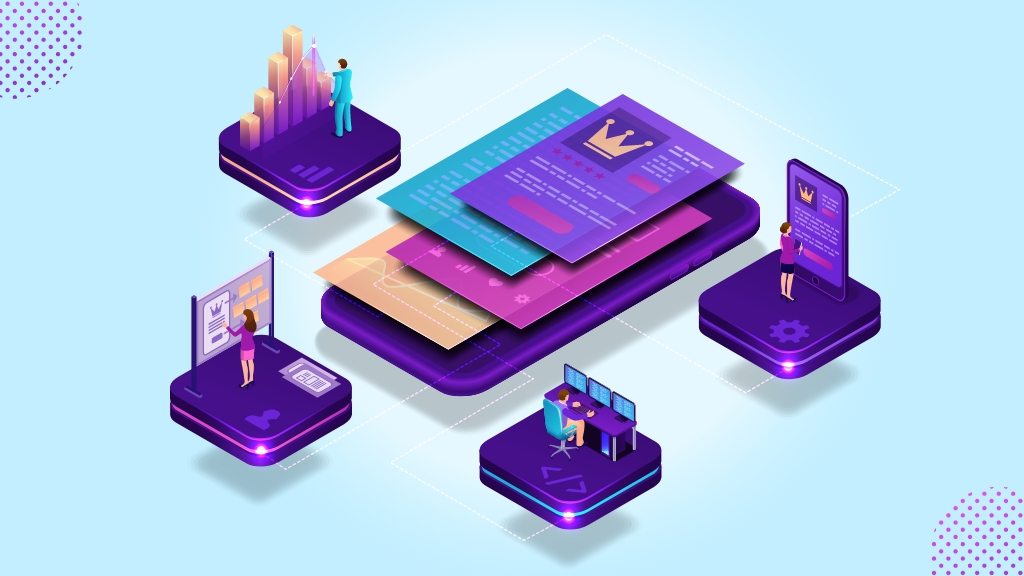Don't miss the chance to work with top 1% of developers.
Sign Up Now and Get FREE CTO-level Consultation.
Confused about your business model?
Request a FREE Business Plan.
3 Challenges Facing the Logistics Industry and How Software can Help
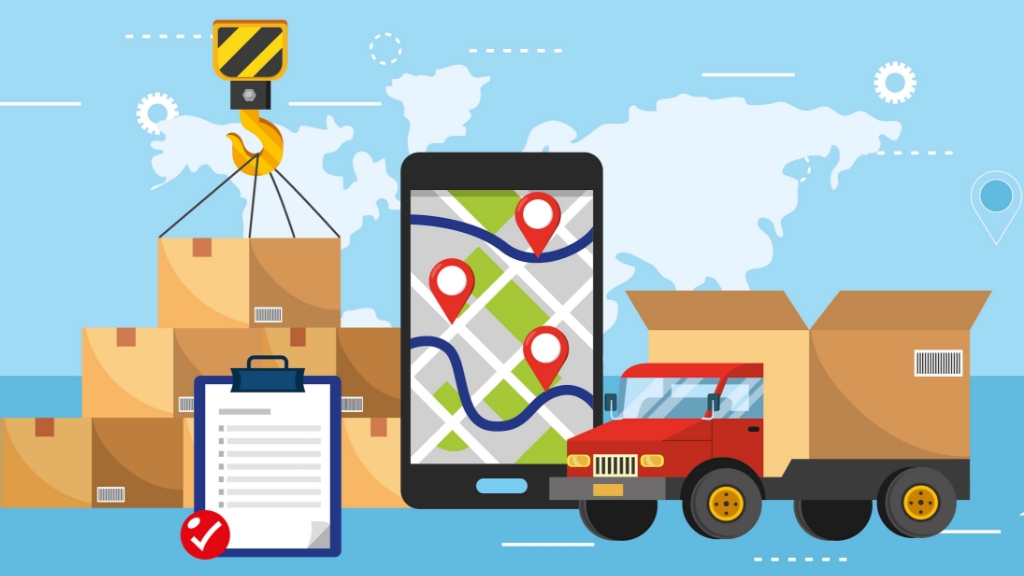
The logistics and transportation industry is multifaceted. As a result, logistics professionals need to work smarter, faster, and with all the available resources efficiently to improve the bottom line of their business.
To stay efficient, several logistics companies opt for technology solutions and software to optimize logistics management by automating their processes. With a desirable level of automation, the data these firms need for planning and making informed decisions is available and can be processed quickly to get important insights.
Also, with the help of technology, logistics businesses can optimize resources and organize everything from a single dashboard to improve efficiency and supply-chain performance. With the rise in the use of technologies like AI, cloud computing, and IoT, the global logistics market is experiencing steady growth and companies are opting for software solutions that help improve their revenues and profit margins.
According to research, the worldwide transportation management system market is expected to reach around $30 Billion by 2025, and software for logistics management can help save companies around 5-10% in logistics costs.
But, can you get logistics software fully customized to your business needs? Or, what type of logistics software helps solve the biggest challenges of the industry? In this blog, we will discuss answers to such questions to help you streamline your logistics and transportation business with the help of technology. So, let’s get started.
What is Logistics Software?
Logistics Management Software or LMS, helps businesses simplify logistics operations by making the required information easily accessible and refining the production process. A logistics management software help businesses manage several processes that are crucial for the production cycle from delivery of raw material on worksites to shipping of finished goods to the consumers.
Over the last decade, logistics software has improved to a considerable extent in functionality and scope to manage a huge range of processes and operations. The functionality and usefulness of LMS software extend to areas like:
- Processing purchase orders
- Suppliers Management
- Processing customer request
- Inventory Management
- Sales and Distribution
A logistics management software helps companies get rid of all the traditional ways of simplifying management like spreadsheets and paperwork. Though it comes in many variations and businesses can also customize the LMS as per their needs, it is majorly of three types, transportation management systems, warehouse management systems, and trade management systems.
Organizations with an in-house supply chain or logistics division and companies providing logistics services as a third party can use any of these as per their business requirements to successfully manage their supply chain operations.
Top 3 Challenges Facing Logistics Businesses and How Software Can Help
Now that we know what logistics software is, let’s put some spotlight on the main challenges you may face in logistics management and see how an LMS can help you solve them.
1. Planning
While planning is crucial for businesses operating in any field, it becomes vital and inevitable in a logistics and transportation business. A supply chain director needs to make the flowcharts for the whole operation, beginning from merchandise purchase and storage to their transportation, and delivery to the required location while managing time, transportation, and expenses altogether.
To stay proficient and successful, managers can use supply chain planning solutions to automatically find out the best transportation strategies as per the parameters and requirements indicated. An appropriate supply chain software can decrease transportation costs, limit stops to warrant speed and the quality of delivery, shorten lead-time, and do much more.
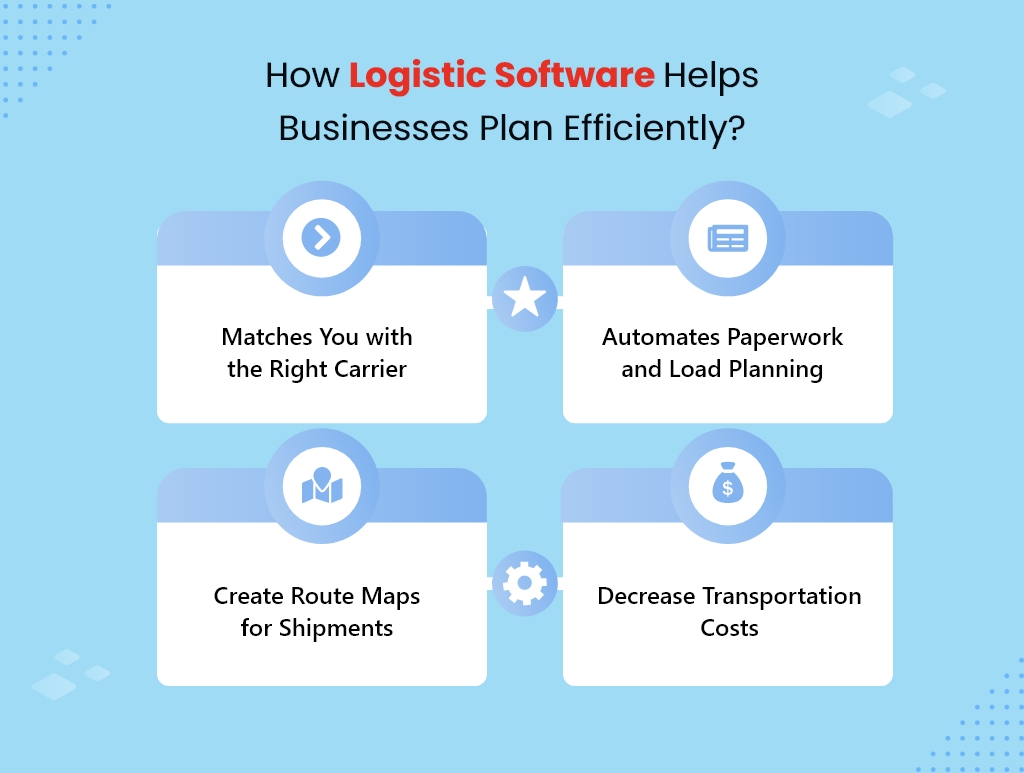
2. Coordination
The most concerning issues in the logistics business come from its fragmentation and irregularity. Since there are numerous stakeholders involved (storekeepers, managers, manufactures, drivers, and end-users) it’s difficult to have centralized and robust control on everything.
Fragmentation usually leads to inefficiency which delays business operation and affects the bottom line of a business. A proven solution to manage this situation is software that synchronizes information between different parties. To make every moving part work productively, the logistics solution should have an integrated tracking framework.
Nowadays all modern logistics software has features like vehicle tracking, load tracking, and they even help managers monitor their driver’s activity in real-time. Logistics routing software also helps find optimal routes taking into consideration road quality, length, and traffic. To avoid potential problems, LMS software can assist you to optimize your routings and make more accurate and attainable transportation plans.
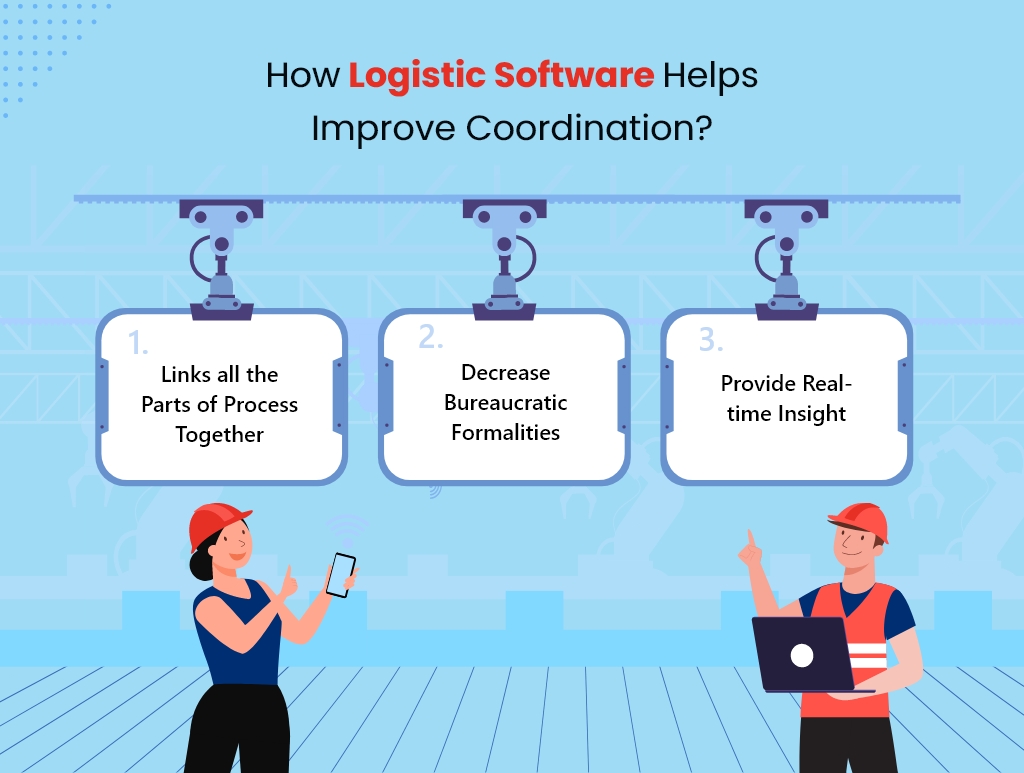
3. Documentation
Logistics business deals with large databases, several partners, customers, serve multiple requests, and as a result, requires extensive documentation. But, a large number of businesses find it difficult to manage paperwork and often face problems due to poorly managed documentation. That’s why all logistics business managers need to have quick access to data. Besides, proper documentation and automation of specific operations also result in decreasing operational costs.
A well-built and robust CRM software can help businesses build and maintain accurate databases and access the information whenever and wherever required. It greatly simplifies and improves the business operations and in turn revenues. All accounts can be automated which will result in less time spent on documentation, because of automated quotes, billing, invoices, and credit notes.
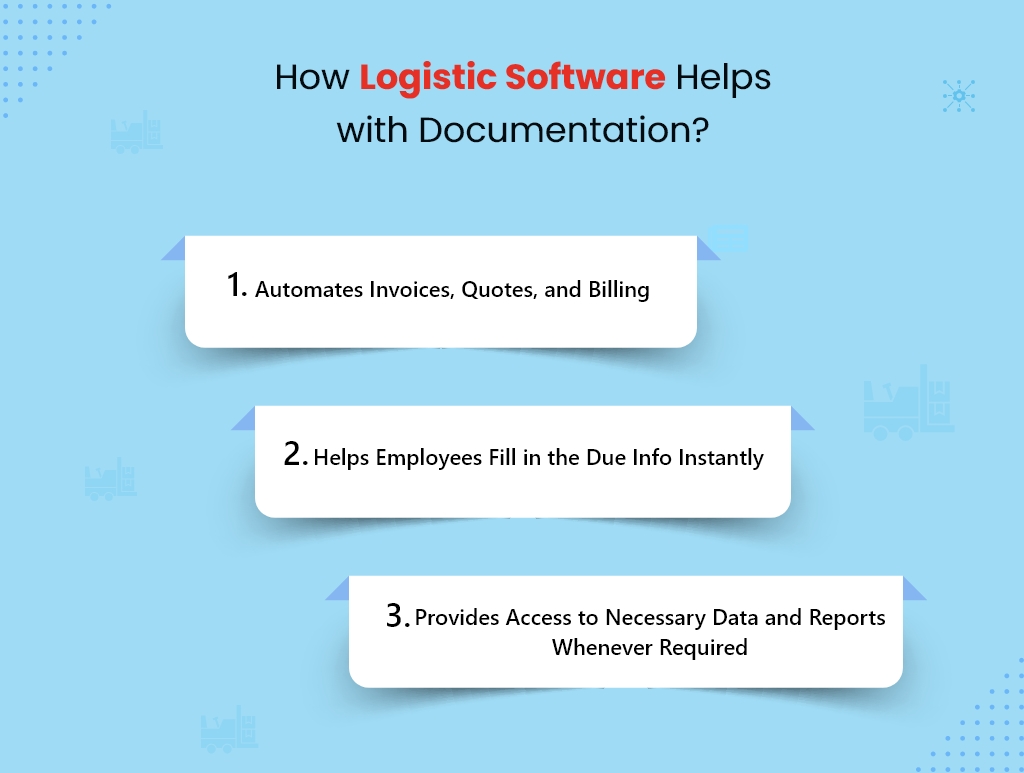
Also Read: 7 Must-Haves to Consider While Developing Apps for Logistics
Logistic Management Software Development: Modules and Features
Logistics is a wide and continuously developing industry of the global economy. Any business sector may require logistics and that’s why it has enormous potential.
Now the answer to what type of logistics software your business needs, depends on your organization’s requirements, functions, and the way it operates. Basically, there exists many modules or types of logistics management software, including:
1. Transport Management Systems
A transport management system is designed to optimize the transportation process of organizations. With the integration of technologies like GPS, it helps businesses track information related to transportation in real-time.
These types of solutions are compatible with different devices so that users can use them from anywhere. The must-have features of a transportation management system include:
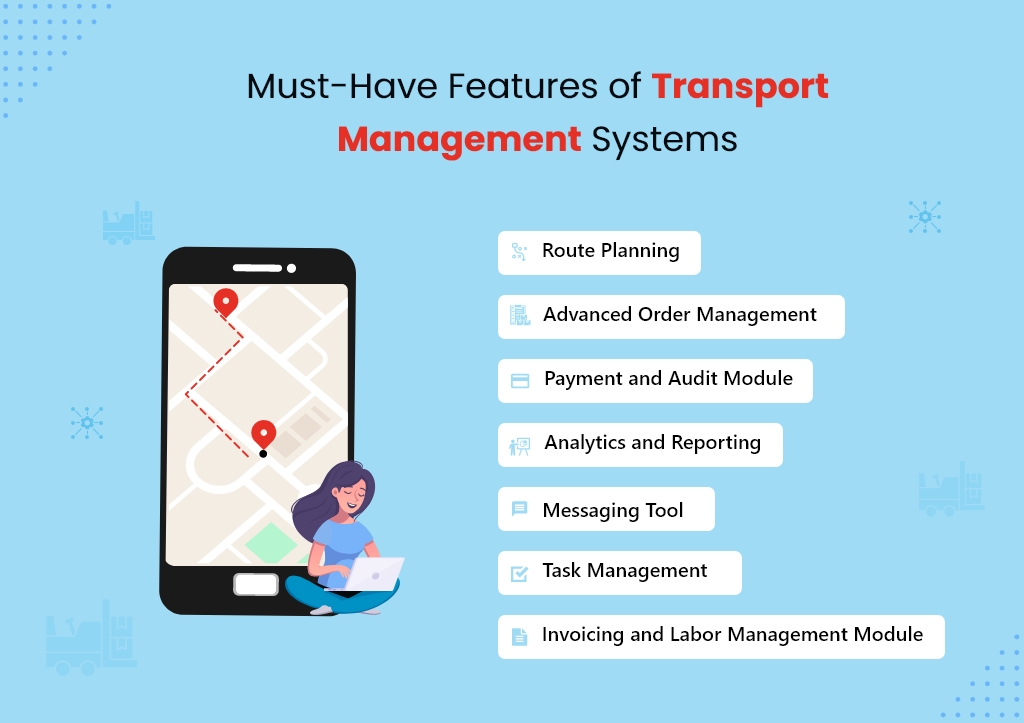
Route Planning: This feature allows businesses to create an optimal road loading plan. With proper planning and scheduling routes, organizations can minimize distances and maximize the use of truck’s capacity. Taking all available cargo into consideration, load planners in turn create optimal shipment combinations.
A full-service route planner software helps businesses choose the most efficient route, taking various elements into consideration like average drive time, client location, delivery schedules, and schedules of other drivers and sales representatives.
Payment and Audit Module: This feature allows a TMS to calculate the charges of freight, evaluate the service options, and find out the areas of improvement. This empowers prompt affirmation and resolution of overcharging-related issues with the customers and carriers alike. Additionally links to ERP or any financial framework permit productive handling of payment procedures.
Advanced Order Management: This feature helps logistics companies decide which warehouse to ship from in order to save time and money.
Analytics and Reporting: Having this feature, companies can exchange information in real-time between distributors, carriers, and customers, which leads to accuracy and increased productivity. Regular sharing of information keeps everyone on the same page, increases visibility, and allows efficient reporting and management.
Messaging Tool: Integrating a messaging tool in the TMS software also let managers communicate with warehouses and drivers to stay updated on any issues that may arise during the loading or transferring of goods.
Task Management: This is a type of calendar where a manager can see every one of the pending and completed tasks. This easy-to-use dashboard helps them resolve problems, conflicts, and make their work plans. Warehouse laborers can utilize this module to make specific sets of products.
Invoicing and Labor Management Module: This module allows managers to send invoices with all the necessary documentation right after the delivery. A labor-management module is like an HR panel for tracking the working hours of employees and managing payrolls.

2. Warehouse Management Systems
A warehouse is simply a central location of every manufacturing business where products are stored, procured, and distributed for further processing. A warehouse management software can help businesses in everything from handling operations like procurement, inspection, acceptance to packing, picking, or even shipping. A WMS helps in every step while recording and managing inventory.
A WMS is the main requirement of the supply chain management that efficiently manages the customer demands of the distribution channels. With a robust warehouse management solution, staff members can stay updated about their daily operations and work productively to attain the given targets.
A WMS shall contain some features of a TMS like order management, tracking and analysis, dashboard management, and more. But, it should also have some specific, like:
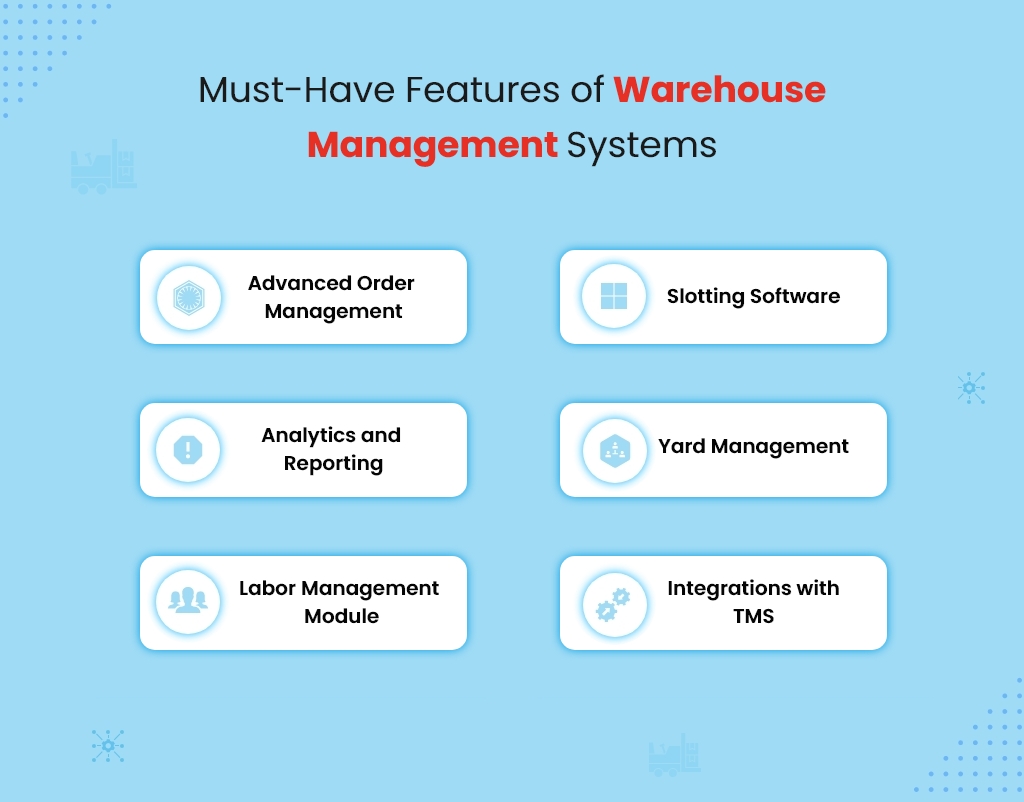
Slotting: This feature tracks product location. A WMS having slotting feature notifies managers if a product isn’t logically placed in the warehouse and suggests improvements. For example, compositors usually select sugar with flour, which means these products should be placed nearby. As a result of having a WMS with slotting software, the workers would be able to pick products more effectively and faster.
Yard Management: This feature helps manage the flow of vehicles to and from the warehouse. For example, the yard management feature ensures that a vehicle comes into the warehouse at a time when loaders begin unloading and loading. It also lists the availability of parking spaces.
3. Trade Management Software
Trade Management Software is used by importers and exporters to oversee their trade operations all around the world. The main function of this software is to help improve collaboration between trade partners and manage operations using a single dashboard. A global trade management software provides sanction tools, international tariff data, electronic data interchange (EDI) software, and export and import requirements.
An ideal TMS software should also allow businesses to manage interaction with suppliers and keep a track of their performance. As a result of using this software, managers know how much they are spending on each item they import and export during production. Additionally, trade management software automates the process of procurement which leads to fewer mistakes and less resource spent as logistics managers can now access well-ordered information and avoid manual problem-solving.
4. Custom Logistics Management Software Development
In addition to the above-mentioned modules, there exist many modules of logistics management software like advanced planning and scheduling software (having business intelligence tools), ERP software, and many others to serve different business needs. But, every business may not need all these functions and that’s where custom logistics management software development comes into play.
You can get your logistics management software customized depending on your business processes and by analyzing your needs from all angles. All you need to do is hire custom logistics management software developers and they will analyze your business model to find the stages of the supply chain you work with. They will provide you a solution not just loaded with advanced but useful features.
Developing logistics management software as per the specific needs of your business adds a lot of value to the entire process and eventually helps you improve your bottom line. It helps businesses to find out their USPs as well as weaknesses to figure out solutions. The robust and ideal logistics management software provides seamless integration to other modules if you plan to scale your business in the future.
Also Read: How Much Does It Cost to Develop Mobile Apps for Logistics?
Should I Buy or Build a Logistics Management Software?
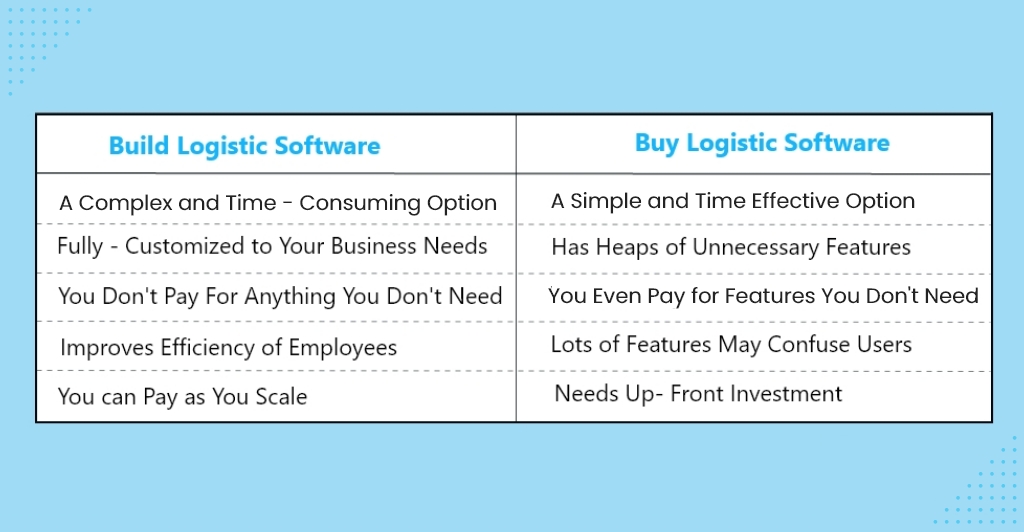
When businesses understand the need for logistics software to run their business operations seamlessly, they are stuck at the question — whether to build or buy one. Logistics is a complex industry with diverse business needs.
You may never find two businesses having the same business model, same set of stakeholders, same goals, and same preferences in the logistic sector. So, how can you imagine that pre-built software will fit in and improve your business processes? Moreover, buying an already built logistics system may sound like an easy or time-effective option, it will not work in the long run.
To seamlessly integrate software into your business processes and get maximum returns, you need to build it as per your needs and business model. Various factors should go into consideration before building a custom business logistics software, including:
- How much automation do you already have?
- Your business operates internationally or domestically?
- What phases of the supply chain do you work with?
- What are your business processes?
- Who are your business stakeholders?
Only when a custom logistics management software development company gets to know these factors, they should be able to develop fully functional software dedicated to solving YOUR business needs. With all this research and analysis data, you will be able to find flaws existing in your business and by collaborating with a company having expertise in logistics software development, you can develop a realistic solution. It will cater to all your needs and will eventually provide maximum return on investment.

Rate this article!
(2 ratings, average: 4.50 out of 5)
Join 60,000+ Subscribers
Get the weekly updates on the newest brand stories, business models and technology right in your inbox.

Nikhil Bansal is the Founder and CEO of Apptunix, a leading Software Development Company helping startups as well as brands in streamlining their business processes with intuitive and powerful mobile apps. After working in the iOS app development industry for more than 10 years, he is now well-equipped with excellent problem-solving and decision-making techniques.

Telemedicine 2.0 - A Comprehensive Guide On What Healthcare Providers Need To Know?
Discover how the latest advancements like Artificial Intelligence in telemedicine are reshaping patient care. This comprehensive resource offers insights into the key trends and innovations driving this shift, providing valuable knowledge for healthcare professionals looking to stay ahead.
Download Now!Subscribe to Unlock
Exclusive Business
Insights!
And we will send you a FREE eBook on 'Mastering Business Intelligence.
